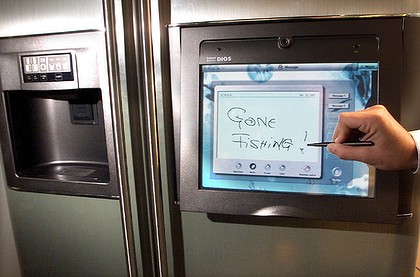Every decade or so, the tech industry gets a hairball in its throat and decides to cough up a hairball in the form of a really bad idea that failed the first or second time around, and tries to hype it into success one more time.
Or as philosopher George Santayana put it, “Those who cannot remember the past are condemned to repeat it.”
The latest iteration of this lack of innovation is the “Internet of Things (IoT).” This is the concept under which virtually every device, system and appliance is connected to the Internet, with its own IP address, its own instruction set and interconnection with all of the other nearby IoT devices. IoT advocates estimate that 1,000 to 5,000 devices will eventually make themselves a part of your life, based on where you are.
Development of the IoT universe is already well underway:
- Samsung and others are creating a new generation of “smart” appliances like refrigerators that can monitor temperatures, maintain shopping lists and more.
- Apple, paying no heed whatsoever to the several iterations of “data watches” that failed in the Eighties, gambled on the success of the iWatch, which is also failing to capture the attention of more than a small herd of geeks.
- Remember the Home of the Future, as envisioned in 1957? There’s a nice summary of home automation features that never caught on at https://www.youtube.com/watch?v=VowfYuhx1-o.
- The AutoGyro and other automobile/airplane hybrids also failed, but development is re-emerging in projects such as the Terrafugia TF-X.
I don’t begrudge the companies that want to pursue this IoT vision, so long as they use their money and not my tax dollars to fund it. I do suggest that before we do anything rash, though, such as dedicating the major theme of the Consumer Electronics Show to hawking these devices, that we take a minute to look backward. (Note: Too late in the case of CES, which had the Internet of Things as a major theme.)
There are three lessons from the past and three from the present that argue against this ever becoming more than a wistful dream:
- Past endeavors in his area failed because they were too complicated for the average consumer. Truth is, synchronizing my data watch with my Windows PC was slow if not downright painful.
- Devices in the past, including the Internet Refrigerator, simply cost too much. Who wants to pay thousands of dollars to know when the milk has gone bad? Just open the carton and take a whiff…
- How on earth can thousands of devices, with minimal standardization in protocols, hope to interact with each other? How many IP addresses will we need, and where will we get them (perhaps IPV 2028)?
- In days of yore, we didn’t have to deal with phishers, hackers and other scam artists. Imagine giving thousands of entry points to hackers to break into your network…
- The items are still expensive – a typical “smart” refrigerator costs nearly 8-0 percent more than a conventional refrigerator in the same configuration.
- We don’t have the infrastructure. Not in power, not in roads, and certainly not in the Internet.
Dreaming of new technology is great fun, and trying out some of these new gizmos is even more so. But with the economy sliding toward a possible recession and talk of yet a third “tech bubble” in our lifetimes, there may be more productive and efficient ways to invest in the tech of the future.
Thanks for reading CPA Practice Advisor!
Subscribe Already registered? Log In
Need more information? Read the FAQs
Tags: Technology





